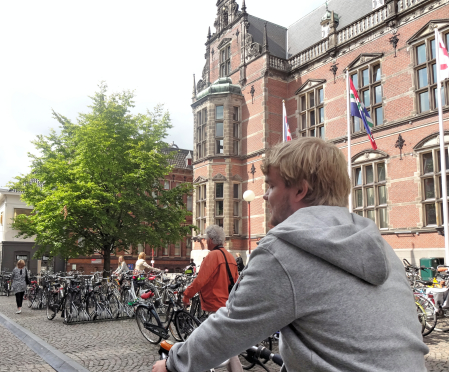Univeristy of Groningen strives for greener world and encourages participation from students and faculty members

Ever since the Industrial Revolution in the 18th century, much of modern society has taken on the general characteristic of industrialization and urbanization, accompanied by acts of indiscreet exploitation and consumption. Nowadays, the impacts of environmental pollution and climate change are dawning upon humanity closer than ever, which shows the need to pursue an ecological society, a society that is in harmony with nature. One of the ways to pursue this goal is through environmental sustainability. As one of the developed countries in the world, Korea has the duty to actively participate in working for environmental sustainability and join the ranks of advanced cases in foreign countries. With the purpose of researching excellent precedents that can help Korea and its universities to become more eco-friendly, reporters from the Ewha Media Center comprising the Ewha Voice, the Ewha Weekly and the Ewha University Broadcasting System conducted overseas research in the Netherlands. Much like Korea, Holland has a large population crowding the relatively small national territory. In this issue, as the first article of a three-part special, the Ewha Voice will discuss the efforts for environmental sustainability in the University of Groningen.
Situated in the northern part of the Netherlands, the University of Groningen (RUG) has been providing high-quality research and education for 400 years with its base in Groningen. In 2012, RUG ranked 53 in the UI Greenmetric Ranking of World Universities, which was the highest among the five Dutch universities in the ranking program that year. As one of the most sustainable universities in Holland, RUG is constantly putting in efforts to make the campus more sustainable, to encourage sustainability research and activities from students and faculty members, and even to collaborate with other organizations and businesses to work on the topic of environmental sustainability.
Why RUG is focusing on environmental sustainability
RUG acknowledges the necessity that universities have to focus on environmental sustainability, even stressing sustainability as its core value.
“This university has three focus areas which are healthy aging, which is really about sustainability of health and energy, sustainable energy, and sustainable society,” said Sibrand Poppema, the president of the board of RUG. “Why are we so interested in having the university green and sustainable? You have to do what you preach. When you preach that our research is in that area and that we want to study those programs, you also have to behave like that.”
The president of the university further takes the concept of environmental sustainability to a personal level.
“I have to confess that almost every day I bike to work,” president Poppema commented with a hearty laugh. “I do not think you will find many university presidents in Korea who will do that, or in the world who will do that.”
There are also various perks that a university has, one of them being the incorporation of different elements in research and education.
“I think what the university can be proud of is the overall integration of sustainability education, and a number of different courses that allow interaction with many different areas in the university possible,” said Gideon Laugs, a Ph.D student at the Centre for Energy and Environmental Sciences in RUG.
Laugs also mentions how the scope of research conducted in universities differentiates from the research done in companies.
“Within my Ph.D, I experience there is a lot of freedom to explore further than just the core question,” Laugs observed. “There is the slow research or perhaps the broader research or deeper research as a university.”

